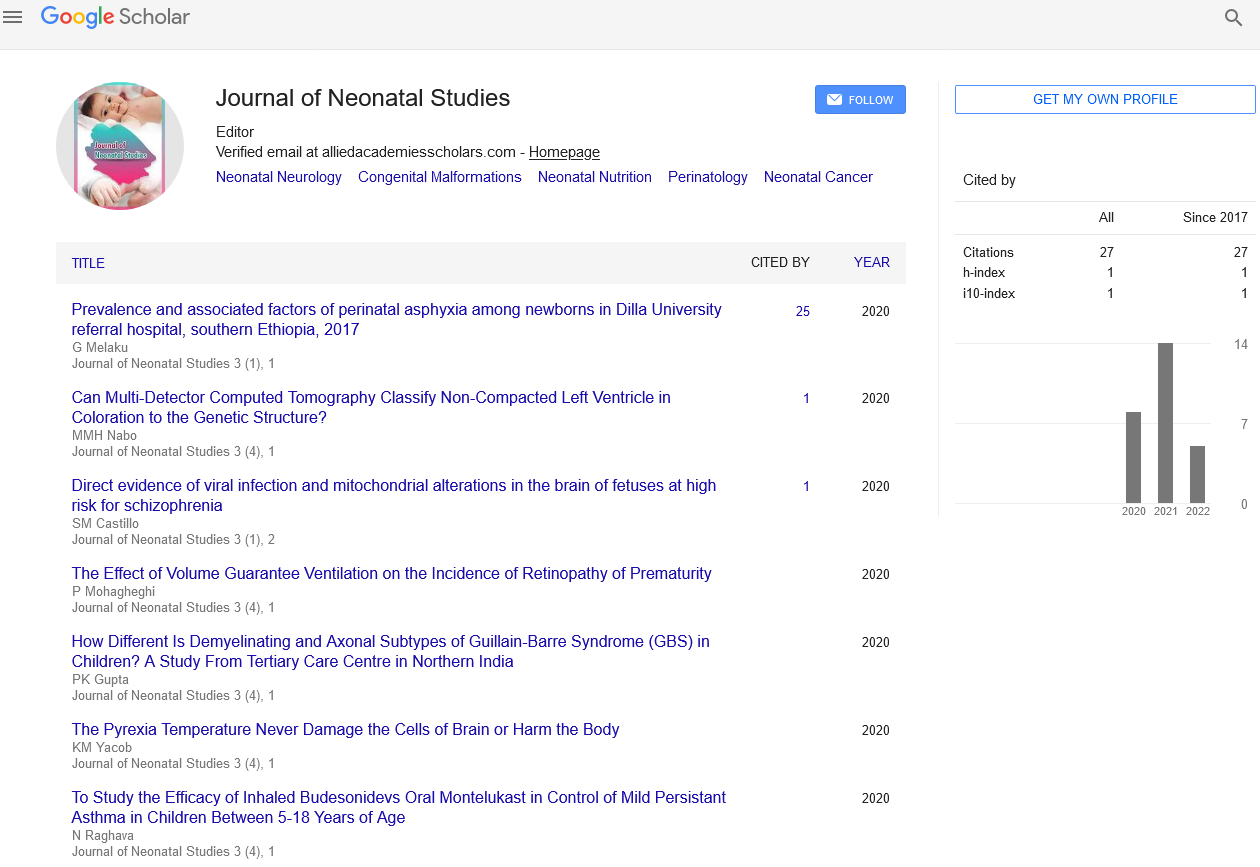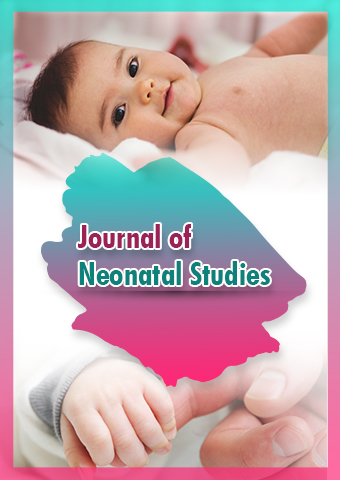Commentary - Journal of Neonatal Studies (2024) Volume 7, Issue 1
Nurturing Tiny Lives: Understanding Neonatal Growth
- Corresponding Author:
- Nianzhou Catho
Department of Pediatrics, Florida State University, Florida, United States
E-mail: ncatho@valeychilds.org
Received: 02-Jan-2024, Manuscript No. JNS-24-124908; Editor assigned: 05-Jan-2024, PreQC No. JNS-24-124908 (PQ); Reviewed: 19-Jan-2024, QC No. JNS-24-124908; Revised: 25-Jan-2024, Manuscript No. JNS-24-124908 (R); Published: 05-Feb-2024, DOI: 10.37532/JNS.2024.7(1).171-172
Description
The neonatal period, spanning the first 28 days of life, is a critical phase characterized by rapid growth and development. Neonatal growth is a complex and intricate process influenced by a myriad of factors, including genetics, nutrition, and environmental conditions. This article delves into the fascinating world of neonatal growth, exploring the key determinants, patterns, and implications for the health and well-being of these fragile, yet resilient, infants.
The foundation of neonatal growth
Genetic factors: Neonatal growth begins with the genetic blueprint inherited from parents. Genetic factors play a pivotal role in determining a child’s potential for growth, influencing height, weight, and overall body composition. Understanding familial growth patterns helps healthcare professionals assess the expected trajectory for a newborn.
Intrauterine environment: The intrauterine environment significantly impacts neonatal growth. Factors such as maternal nutrition, health, and exposure to environmental stressors influence fetal development. Adequate prenatal care and a nourishing environment contribute to optimal intrauterine growth, setting the stage for a healthy neonatal period.
Patterns of neonatal growth
Physical growth: Physical growth in neonates is most visibly expressed through changes in weight, length, and head circumference. These parameters are routinely measured and plotted on growth charts to monitor development and identify potential issues. Weight gain, in particular, is a critical indicator of nutritional adequacy and overall well-being.
Brain development: The neonatal period is characterized by rapid brain development. Adequate nutrition, especially essential fatty acids like omega-3 and omega-6, is crucial for optimal brain growth and neurodevelopment. The early experiences and stimuli a newborn receives also contribute to the formation of neural connections.
Organ maturation: Neonatal growth extends beyond external measures to encompass the maturation of internal organs. Organs such as the liver, lungs, and kidneys undergo significant development during this period, adapting to the demands of independent life outside the womb.
Nutritional milestones: Nutrition is a cornerstone of neonatal growth. Breast milk, ideally suited to meet the nutritional needs of newborns, provides essential nutrients, antibodies, and growth factors. Premature infants or those with specific health concerns may require specialized formulations to support their growth and development.
Determinants of neonatal growth
Nutrition: Adequate nutrition is paramount for neonatal growth. The quality and quantity of nutrients, including proteins, carbohydrates, fats, vitamins, and minerals, contribute to healthy development. Breastfeeding, recognized for its numerous benefits, promotes optimal nutrition and supports immune function.
Environmental factors: The environment in which a neonate is raised influences growth. Exposure to tobacco smoke, pollutants, and inadequate living conditions can hinder growth and contribute to health challenges. A nurturing and safe environment, on the other hand, fosters optimal growth and development.
Health status: Neonatal health, including the absence of congenital conditions or infections, is pivotal for sustained growth. Medical interventions and treatments may be necessary for infants facing health challenges, emphasizing the interconnectedness of healthcare and growth outcomes.
Genetic blueprint: The genetic makeup of a newborn establishes the foundation for growth. Understanding familial growth patterns aids healthcare providers in assessing whether a neonate’s growth aligns with their genetic potential. Genetic conditions may necessitate specialized care and monitoring.
Implications and challenges
Preterm birth: Preterm infants often face challenges in achieving optimal growth due to their premature entry into the world. Specialized care, including nutritional support and developmental interventions, is crucial for promoting catch-up growth and minimizing long-term consequences.
Nutritional challenges: Neonates born with medical conditions or those requiring intensive care may face difficulties in establishing optimal nutrition. Addressing nutritional challenges promptly, whether through specialized formulas or parenteral nutrition, is vital for supporting growth in these vulnerable infants.
Neonatal Intensive Care Unit (NICU) graduates: Infants who spend time in the NICU may experience growth delays due to the challenges associated with preterm birth or medical complications. Follow-up care, including nutritional support and developmental assessments, is essential to monitor and address potential growth issues in NICU graduates.
Long-term impact: Neonatal growth patterns can have long-term implications for health and development. Growth faltering during the neonatal period may be associated with increased risk for metabolic conditions, cognitive challenges, and overall compromised well-being later in life.
Future perspectives and care
Research and innovation: Ongoing research and technological advancements continue to enhance our understanding of neonatal growth. Innovations in nutritional science, developmental care, and medical interventions contribute to improved outcomes for neonates facing growth challenges.
Comprehensive healthcare: A holistic approach to neonatal care encompasses not only medical interventions but also support for families, nutritional guidance, and early developmental interventions. Comprehensive healthcare ensures that neonates receive the multidimensional support necessary for optimal growth.
Community and family involvement: Involving communities and families in promoting neonatal growth is crucial. Education about nutrition, healthcare practices, and early intervention strategies empowers caregivers to contribute actively to the well-being of newborns.
Global health initiatives: Global health initiatives focusing on maternal and neonatal care play a pivotal role in addressing growth challenges. Access to prenatal care, nutrition education, and healthcare resources are essential components of initiatives aimed at promoting healthy neonatal growth worldwide.
Neonatal growth, a dynamic and intricate process, sets the stage for a child’s future health and well-being. Understanding the factors influencing growth, monitoring developmental milestones, and providing timely interventions contribute to fostering healthy neonatal growth. As research advances and healthcare practices evolve, the potential to optimize neonatal outcomes and support the growth of these tiny lives becomes increasingly promising.

